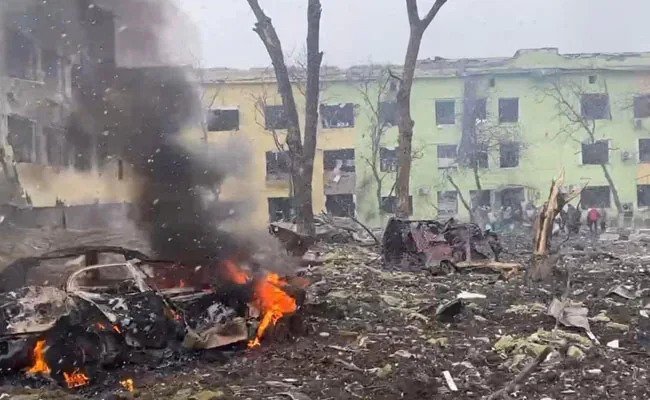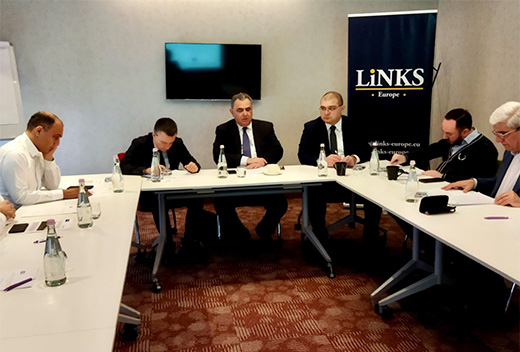
Restoring Communication Links is an Important Confidence-building Measure  By Benyamin POGHOSYAN, PhD, Chairman, Center for Political and Economic Strategic Studies
By Benyamin POGHOSYAN, PhD, Chairman, Center for Political and Economic Strategic Studies
There is broad consensus in the region and in the international community on the need to restore communications in the South Caucasus and on the possibility of finding mutually accepted solutions for this to be achieved. However the constant focus on the routes passing via the Syunik region and connecting Azerbaijan with Nakhijevan has made the whole process of restoration of communications a bone of contention for both sides. The restoration of communications may still play a positive role in the establishment of good neighbourly relations between Armenia and Azerbaijan, by creating conditions from which both societies can benefit. However, if the sides continue this tit-for-tat discussion around the "Zangezur corridor," blaming each other for violating previous agreements, the restoration of communications issue will only deepen the mistrust between them, he adds. Starting instead with a railway connection between Armenia and Nakhijevan via Yersakh on the other hand, requires only a further 1 km of railroad to be constructed, and will serve as a significant confidence-building measure between Armenia and Azerbaijan and will make it easier for Armenia and Azerbaijan to agree on the modalities for the restoration of other routes. READ MORE
- EGF Editor |
Published on EGF: 23.06.2022
| External Relations
-
Will Azerbaijan become a NATO pawn against Russia in South Caucasus?  By Yeghia TASHJIAN, Beirut-based regional analyst and researcher, columnist, "The Armenian Weekly”
By Yeghia TASHJIAN, Beirut-based regional analyst and researcher, columnist, "The Armenian Weekly”
Despite Azerbaijani President Ilham Aliyev’s adherence to the ideology of pan-Turkism, the former-Soviet republic has long managed to successfully balance its relations between Russia, Turkey, and the west. However, the ‘frozen conflict’ with Armenia over disputed Nagorno-Karabakh territory, and the on-going conflict in Ukraine, have recently tested the limits of this balancing act. In January 2022, as Russia’s military build-up on Ukraine’s border was in full swing, Aliyev visited his counterpart Volodymyr Zelensky in Kyiv and reaffirmed Baku’s support for Ukraine’s territorial integrity. Then, the following month – just two days before Russia announced its ‘special military operation’ in Ukraine – Aliyev was in Moscow signing a treaty of alliance with Russian President Vladimir Putin. READ MORE
- EGF Editor |
Published on EGF: 16.06.2022
| External Relations
-
Iran and Turkey Rift Grows Over Dam Construction Projects
 By Fuad SHAHBAZOV, Baku-based independent regional security and defence analyst
By Fuad SHAHBAZOV, Baku-based independent regional security and defence analyst
Tensions between Turkey and Iran were recently rekindled by the latter constructing a dam over transboundary waterways, namely the Aras, Tigris, and Euphrates rivers. Iran is accusing Turkey of intentionally triggering a regional drought and water shortage –– both of which have impacted Iran brutally. Ankara says Iran’s claims are a diversion.
A new round of disagreements between Iran and Turkey began when Iranian Foreign Minister Hossein Amir-Abdollahian criticized Turkey’s dam projects on the Aras and Tigris rivers –– the main transboundary waterways in the region –– citing the threats to water flow in the area and environmental damage to regional states in his speech before Iran’s Parliament on May 10. Abdollahian said he has called on “his Turkish counterpart at least three times over the past months to pay serious attention to the construction of dams on the Aras River.” READ MORE
- EGF Editor |
Published on EGF: 09.06.2022
| External Relations
-
The Impact of the War in Ukraine on Russian-Turkish Relations  By Eugene KOGAN, Tbilisi-based defence and security expert
By Eugene KOGAN, Tbilisi-based defence and security expert
Russian-Turkish relations are in large part based on the personal chemistry, affinity, and trust between Presidents Vladimir Putin and Recep Tayyip Erdoğan. Russia’s invasion of Ukraine has put these personal ties to the test. While President Erdoğan also maintains a close working relationship with Ukrainian President Volodymyr Zelenskyy and Turkish-Ukrainian military ties are strong, it has become clear that Erdoğan is not willing to sacrifice relations with Putin for Zelenskyy’s sake. Moreover, Erdoğan’s efforts to mediate between the two leaders have been either rebuffed or ignored by Putin. As Russia’s war in Ukraine continues, where things go from here is far from certain, but it is worth considering the range of possibilities. READ MORE.
- EGF Editor |
Published on EGF: 01.06.2022
| External Relations
-
Iran Plays Its Cards in the South Caucasus  By Yeghia TASHJIAN, Beirut-based regional analyst and researcher, columnist, "The Armenian Weekly”
By Yeghia TASHJIAN, Beirut-based regional analyst and researcher, columnist, "The Armenian Weekly”
In recent months, Iran has engaged in active foreign policy in the South Caucasus to push its geo-economic interests forward. Meanwhile, Western-led economic sanctions have pushed Russia to realize the significance of the North-South trade route. Iran defused and refreshed its relations with Azerbaijan and by engaging with Armenia it decreased Baku’s political pressure on Yerevan. The following analysis will highlight the recent events and the role Armenia and Azerbaijan play in Iran’s regional trade and economic interests. READ MORE
- EGF Editor |
Published on EGF: 01.06.2022
| External Relations
-
Turkey’s Endgame in the Normalization Process with Armenia  By Benyamin POGHOSYAN, PhD, Chairman, Center for Political and Economic Strategic Studies
By Benyamin POGHOSYAN, PhD, Chairman, Center for Political and Economic Strategic Studies
Armenia–Turkey normalization process was officially launched on January 14, 2022 when special representatives – the Deputy Speaker of the Armenian Parliament Ruben Rubinyan and Ambassador Serdar Kılıç – met in Moscow. The groundwork for this meeting began in mid-2021, when the Armenian government proposed the idea of peace in the South Caucasus and normalizing relations with Azerbaijan and Turkey. Armenia’s catastrophic defeat in the 2020 Karabakh war seemed to put aside one of the main obstacles to launching the Armenia–Turkey normalization process. The 2008-2009 “football diplomacy” failed mainly due to Turkey’s precondition to Armenia to return “occupied lands” to Azerbaijan. By signing the November 10, 2020 statement, the Armenian government accepted the loss of seven regions outside the former Nagorno Karabakh Autonomous Region (NKAR), as well as 30-percent of territories of NKAR itself. READ MORE
- EGF Editor |
Published on EGF: 12.05.2022
| External Relations
-
Armenia Faces a Critical Choice in Nagorno-Karabakh  By Benyamin POGHOSYAN, PhD, Chairman, Center for Political and Economic Strategic Studies
By Benyamin POGHOSYAN, PhD, Chairman, Center for Political and Economic Strategic Studies
April 2022 was marked by significant developments around the settlement of the Nagorno-Karabakh conflict. When Russia launched a “special military operation” in Ukraine on February 24, it seemed that all other post-Soviet conflicts would enter “silent mode,” as no one would care about Nagorno-Karabakh, Abkhazia, South Ossetia or Transnistria. However, this was not the case, at least for Nagorno-Karabakh. On April 6, 2022, the European Union organized an Armenia–Azerbaijan summit in Brussels. President Aliyev and Prime Minister Pashinyan agreed to form a border demarcation/delimitation commission until the end of April and take concrete steps to start peace talks. The issue of border delimitation and demarcation also was among key priorities during the November 2021 Sochi meeting facilitated by Russian President Putin. However, despite the signature of the trilateral statement, no tangible moves have been made. READ MORE
- EGF Editor |
Published on EGF: 28.04.2022
| External Relations
-
Quo Vadis Nagorno-Karabakh  By Benyamin POGHOSYAN, PhD, Chairman, Center for Political and Economic Strategic Studies
By Benyamin POGHOSYAN, PhD, Chairman, Center for Political and Economic Strategic Studies
The discussions about possible Armenia – Azerbaijan peace treaty surfaced again during the last Pashinyan – Aliyev meeting held in Brussels on April 6, 2022. At their meeting which was hosted by the European council president, Charles Michel, the two leaders agreed to instruct their foreign ministers to prepare for the start of the negotiations. On April 11, the Armenian and Azerbaijani foreign ministers held a phone talk and discussed the details of the upcoming process. The EU was not the only external actor pushing forward for the peace deal. Before and after the April 6 meeting in Brussels, Aliyev and Pashinyan spoke separately with Russian President Putin, who emphasized the significance of peace and reiterated Russia's willingness to support Armenia and Azerbaijan. The US Secretary of State Blinken also confirmed the US readiness to facilitate the comprehensive settlement between Armenia and Azerbaijan. READ MORE
- EGF Editor |
Published on EGF: 21.04.2022
| External Relations
-
The South Caucasus from War to Peace: 30 Measures between Now and 2030  Joint Armenian-Azerbaijani Liaison Group on confidence-building measures
Joint Armenian-Azerbaijani Liaison Group on confidence-building measures
The Joint Armenian-Azerbaijani Liaison Group on confidence-building measures in support of lasting peace in the South Caucasus has published its report in which it proposes 30 short, medium and long term measures in support of ongoing efforts to establish peace in the region. On Wednesday, 6 April, members of the Working Group, presented their report to the EU Special Representative for the South Caucasus, Toivo Klaar, and other EU officials at a special briefing in Brussels. In their report, published on the eve of the meeting between the leaders of Armenia and Azerbaijan and the president of the European Union in Brussels on 6 April, the group says that "all the ingredients for peace exist in the South Caucasus. All the ingredients for war exist too. What is in front of us is a choice". The group says that the proposed measures are a building block in the quest for peace but if the ideas being proposed are implemented the objective of building a peaceful, secure and prosperous South Caucasus will be much closer to being achieved. It was now necessary that all concerned should put effort into turning the thirty measures being proposed in the report into tangible action.
The work of the Joint Liaison Group was co-ordinated and facilitated by LINKS Europe - an independent foundation based in The Hague, The Netherlands - in the framework of the European Union's EU4Peace initiative. READ MORE
- EGF Editor |
Published on EGF: 13.04.2022
| External Relations
-
New Meeting between Pashinyan and Aliyev in Brussels: What next  By Benyamin POGHOSYAN, PhD, Chairman, Center for Political and Economic Strategic Studies
By Benyamin POGHOSYAN, PhD, Chairman, Center for Political and Economic Strategic Studies
On April 6, 2022, Armenian Prime Minister Nikol Pashinyan and Azerbaijani President Ilham Aliyev held a meeting in Brussels mediated by the President of the European Council, Charles Michel. It was the second meeting in Brussels mediated by the European Union. The first took place in December 2021; on February 4, 2022, Armenian and Azerbaijan leaders held an online meeting with the participation of Michel and French President Emmanuel Macron. A week before the April 6 meeting, the EU hosted a meeting of high-level officials from Armenia and Azerbaijan in Brussels to advance joint efforts to find solutions to issues between both countries. The meeting between Secretary of the Security Council of Armenia Armen Grigoryan and assistant to the President of Azerbaijan Hikmet Hajiyev was facilitated by the EU Special Representative for the South Caucasus Toivo Klaar. As a result of the April 6 meeting, Pashinyan and Aliyev agreed to instruct their Ministers of Foreign Affairs to work on the preparation of a future peace treaty, which would address all necessary issues. READ MORE
- EGF Editor |
Published on EGF: 13.04.2022
| External Relations
-
